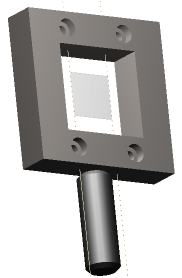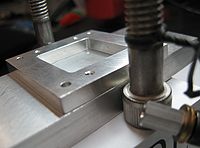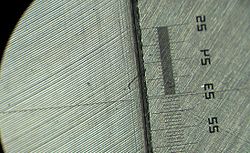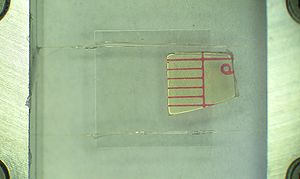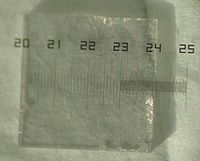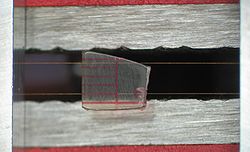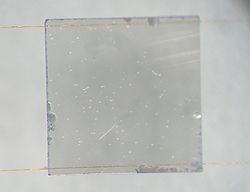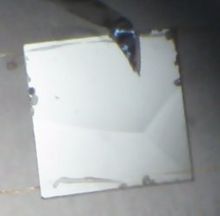Difference between revisions of "Hardware for Mounting of Diamond Radiators"
Senderovich (talk | contribs) |
|||
| (16 intermediate revisions by 2 users not shown) | |||
| Line 1: | Line 1: | ||
== Mounting Bracket == | == Mounting Bracket == | ||
| + | The following hardware was built in preparation for the May, 2009 CHESS run. | ||
[[Image:DiaMountBracket.png|frame|Exploded view of the mounting bracket with the diamond shown suspended on stretched wires.]] | [[Image:DiaMountBracket.png|frame|Exploded view of the mounting bracket with the diamond shown suspended on stretched wires.]] | ||
| − | * Mounting Bracket: [http://zeus.phys.uconn.edu/~senderovich/GlueX/Diamonds/MountingBracket/DiaMountBracket.tcw TCW] | + | * Aluminum Mounting Bracket: [http://zeus.phys.uconn.edu/~senderovich/GlueX/Diamonds/MountingBracket/DiaMountBracket.tcw TCW] |
** Front Half: [http://zeus.phys.uconn.edu/~senderovich/GlueX/Diamonds/MountingBracket/DiaMountBracket_F.pdf PDF] [http://zeus.phys.uconn.edu/~senderovich/GlueX/Diamonds/MountingBracket/DiaMountBracket_F.tcw TCW] | ** Front Half: [http://zeus.phys.uconn.edu/~senderovich/GlueX/Diamonds/MountingBracket/DiaMountBracket_F.pdf PDF] [http://zeus.phys.uconn.edu/~senderovich/GlueX/Diamonds/MountingBracket/DiaMountBracket_F.tcw TCW] | ||
** Back Half [http://zeus.phys.uconn.edu/~senderovich/GlueX/Diamonds/MountingBracket/DiaMountBracket_B.pdf PDF] [http://zeus.phys.uconn.edu/~senderovich/GlueX/Diamonds/MountingBracket/DiaMountBracket_B.tcw TCW] | ** Back Half [http://zeus.phys.uconn.edu/~senderovich/GlueX/Diamonds/MountingBracket/DiaMountBracket_B.pdf PDF] [http://zeus.phys.uconn.edu/~senderovich/GlueX/Diamonds/MountingBracket/DiaMountBracket_B.tcw TCW] | ||
| + | |||
| + | The intended wire for clamping in this bracket is the 20 μm diameter tungsten wire borrowed from CMU. The bracket should have the planarity to handle this. Assuming elastic deformation of the bracket around the wires, force of order 100 N is expected, yielding to a force of friction well above the above the elastic limit of the wire (i.e. the wire will break before clamp releases it.) | ||
| Line 32: | Line 35: | ||
'''Master Bond, Inc.''' (Mfg.) | '''Master Bond, Inc.''' (Mfg.) | ||
(awaiting call) | (awaiting call) | ||
| + | |||
| + | |||
| + | == Diamond Mounting Trials == | ||
| + | |||
| + | Simple wire stretching exercises were performed. The wire is approximated to be well past its elastic limit bearing 50 g weight. A thumb screw threading two washers going into a threaded stand-off (long nut) provided a nice 4.8 g weight that can clamp wire. So, a wire loop is created by clamping the ends of a wire segment between the washers by tightening the thumb screw. | ||
| + | |||
| + | {| border="0" align="center" | ||
| + | |- align="center" valign="top" | ||
| + | | [[Image:WireStretchTests.jpg|thumb|200px|Figure 1. Simple setup for testing wire stretching. Cap head bolts take the place of precise diameter rods that specify wire spacing. The ~5 g weight is shown on the right.]] | ||
| + | || [[Image:MBWireMarks.jpg|thumb|250px|Figure 2. Photo of a groove embossed by the clamped tungsten wire. (Numbers indicate mm markings)]] | ||
| + | |} | ||
| + | |||
| + | The tungsten wire was stretched using this weight and the shanks of cap head screws to keep the segments parallel. Playing with the first setup showed that the wire breaks quite easily and indeed, breaks before there is enough force to release it from the clamp of the bracket. The experience also showed that the wire is easily denatured (observed through kinks present even when stretched) so care must be taken in taking it off the spool and navigating around the supports. | ||
| + | |||
| + | {| border="0" align="center" | ||
| + | |- align="center" valign="top" | ||
| + | | [[Image:GlueTest_glass.jpg|thumb|300px|Figure 3. A square glass sample 12 mm on the side glued to the 20 μmm wires for practice. ]] | ||
| + | |} | ||
| + | |||
| + | All following gluing tests were performed with the Supertacker 351 mentioned above. This adhesive turned out to be a bit too viscous for depositing on such thin wire. It did, however, match our other criteria very well. The trick for using it with these wires was to get inside tweezers and slide them gently with the wire in the opening of the tweezers. A somewhat sloppy layer is deposited on the wire that should still be quite tacky during the minute or so while a sample is deposited. In fact, it grips quite well upon first contact with a clean surface, such that alignment of the sample's edge with the wire is difficult. | ||
| + | |||
| + | {| border="0" align="center" | ||
| + | |- align="center" valign="top" | ||
| + | | [[Image:DiaSize.jpg|200px|thumb|Figure 4. Photo of the diamond with a mm scale. It appears to be fairly precisely 4 mm]] | ||
| + | || [[Image:Wires_6-32.jpg|250px|thumb|Figure 5. Trial of stretching wires spaced by the shank of a 6-32 screw. The resulting spacing of 3.5 mm is just a little too narrow for our 4 mm diamond.]] | ||
| + | |} | ||
| + | |||
| + | Figure 3 shows a square piece of glass, 12 μmm on the side, glued to the wire for practice. A much smaller diamond from BNL, currently 300 mm thick is shown in Figure 4. The shank of a 6-32 screw was thought to be a good spacer (Figure 5) for the wires but its roughly 3.5 mm diameter would take up a bit too large a margin of the diamond. The minor diameter of a 10-32 screw at about 3.7 mm seemed more appropriate. The wires were stretched with the latter prescription and the diamond was glued (Figure 6). | ||
| + | |||
| + | {| border="0" align="center" | ||
| + | |- align="center" valign="top" | ||
| + | | [[Image:DiaGlued.jpg|thumb|250px|Figure 6. The photo shows the diamond glued to 20 μm wires spaced by the minor diameter of 10-32 screws.]] | ||
| + | || | ||
| + | | [[Image:Dia_Yboundary.jpg|thumb|220px|Figure 7. A strange artifact, potentially challenging the notion that this is a mono-crystal. A slightly different lighting angle shows very flat surfaces (so these are not likely surface features.) Photo orientation: left is the direction of the goniometer mounting rod.]] | ||
| + | |} | ||
| + | |||
| + | |||
| + | === Minimal Supply List for Diamond Mounting === | ||
| + | |||
| + | The following is a useful minimal tool kit for mounting the diamonds on wires clamped in the holder described above. | ||
| + | |||
| + | * Supertacker 351 | ||
| + | * toluene | ||
| + | * alcohol | ||
| + | * kim wipes | ||
| + | * cotton swab tips | ||
| + | * clear plastic wrap | ||
| + | * foil | ||
| + | * Scotch tape | ||
| + | * scissors | ||
| + | * hex driver for size 4 cap screw | ||
| + | * tweezers (point tip preferred) | ||
| + | * (2) 10-32 screws | ||
| + | * ~5g weight with wire clamp (thumb screw, mating threaded stand-off, 2 washers) | ||
| + | * twist ties | ||
| + | * ''recommended'': vice, 2" mouth minimum | ||
| + | |||
| + | == References == | ||
| + | |||
| + | * [http://www.xhuber.de/en/Products/diffractometers/xray/single_crystal/5020/5020.rsys Diffractometer at CHESS] | ||
| + | * [http://zeus.phys.uconn.edu/~senderovich/GlueX/Diamonds/MountingBracket/DiaMountBracket_Shaft.pdf Diamond mount support post] | ||
Latest revision as of 17:24, 27 August 2011
Mounting Bracket
The following hardware was built in preparation for the May, 2009 CHESS run.
The intended wire for clamping in this bracket is the 20 μm diameter tungsten wire borrowed from CMU. The bracket should have the planarity to handle this. Assuming elastic deformation of the bracket around the wires, force of order 100 N is expected, yielding to a force of friction well above the above the elastic limit of the wire (i.e. the wire will break before clamp releases it.)
Choice of Adhesives
Ellsworth Adhesives (Dist. Germantown, WI), Resinlab Cynergy Line:
- 6103 Metal Bonding Cyanoacrylate Adhesive [1]
- 6402 Toughened Cyanoacrylate Adhesive [2]
- Also available:
- AR 4305HP [5] (more general purpose, toluene-sensitive)
- 736 high temp. silicone sealant: 500F continuous use, degradation at 600F
Frank Murken Products (Dist. Schenectady, NY) (awaiting call)
Hernon Manufacturing, Inc. (Mfg. Sanford, FL) (in contact with Nicholas LaBarre)
- Supertacker 351 (easily dissolved with toluene etc.) [6]
- Silastomer 333
K.R. Anderson, Inc. (Dist.), Morgan Hill, CA
- Representative: nothing available
Master Bond, Inc. (Mfg.) (awaiting call)
Diamond Mounting Trials
Simple wire stretching exercises were performed. The wire is approximated to be well past its elastic limit bearing 50 g weight. A thumb screw threading two washers going into a threaded stand-off (long nut) provided a nice 4.8 g weight that can clamp wire. So, a wire loop is created by clamping the ends of a wire segment between the washers by tightening the thumb screw.
The tungsten wire was stretched using this weight and the shanks of cap head screws to keep the segments parallel. Playing with the first setup showed that the wire breaks quite easily and indeed, breaks before there is enough force to release it from the clamp of the bracket. The experience also showed that the wire is easily denatured (observed through kinks present even when stretched) so care must be taken in taking it off the spool and navigating around the supports.
All following gluing tests were performed with the Supertacker 351 mentioned above. This adhesive turned out to be a bit too viscous for depositing on such thin wire. It did, however, match our other criteria very well. The trick for using it with these wires was to get inside tweezers and slide them gently with the wire in the opening of the tweezers. A somewhat sloppy layer is deposited on the wire that should still be quite tacky during the minute or so while a sample is deposited. In fact, it grips quite well upon first contact with a clean surface, such that alignment of the sample's edge with the wire is difficult.
Figure 3 shows a square piece of glass, 12 μmm on the side, glued to the wire for practice. A much smaller diamond from BNL, currently 300 mm thick is shown in Figure 4. The shank of a 6-32 screw was thought to be a good spacer (Figure 5) for the wires but its roughly 3.5 mm diameter would take up a bit too large a margin of the diamond. The minor diameter of a 10-32 screw at about 3.7 mm seemed more appropriate. The wires were stretched with the latter prescription and the diamond was glued (Figure 6).
Minimal Supply List for Diamond Mounting
The following is a useful minimal tool kit for mounting the diamonds on wires clamped in the holder described above.
- Supertacker 351
- toluene
- alcohol
- kim wipes
- cotton swab tips
- clear plastic wrap
- foil
- Scotch tape
- scissors
- hex driver for size 4 cap screw
- tweezers (point tip preferred)
- (2) 10-32 screws
- ~5g weight with wire clamp (thumb screw, mating threaded stand-off, 2 washers)
- twist ties
- recommended: vice, 2" mouth minimum
